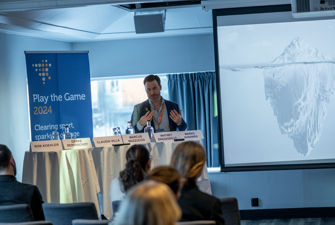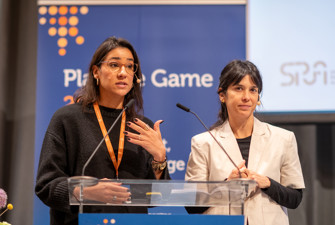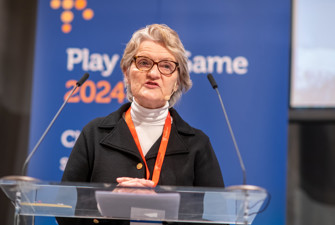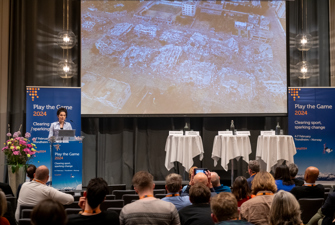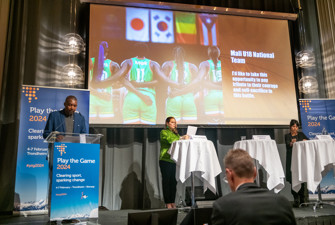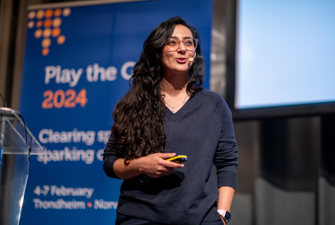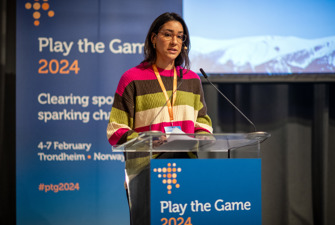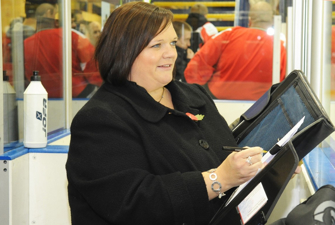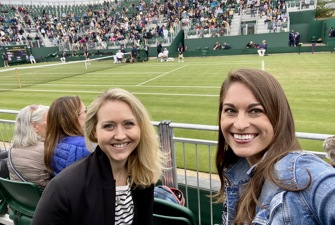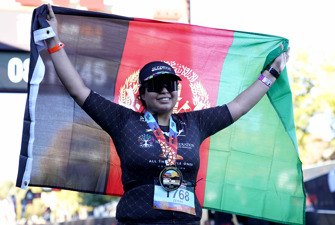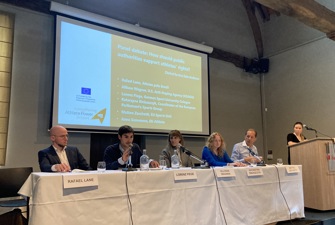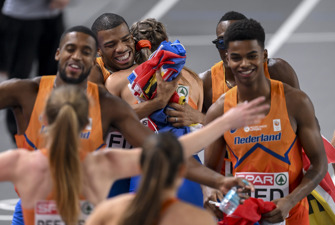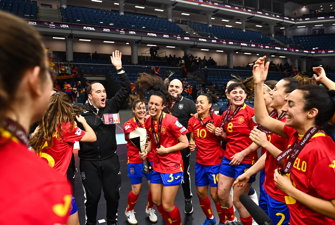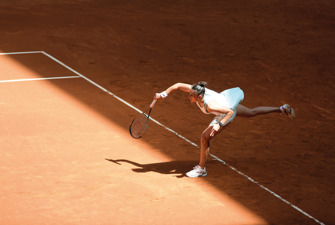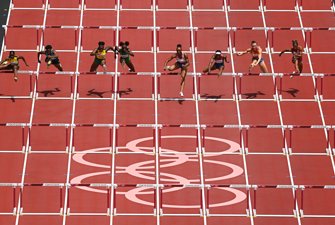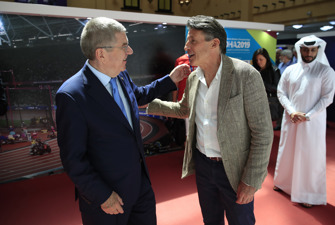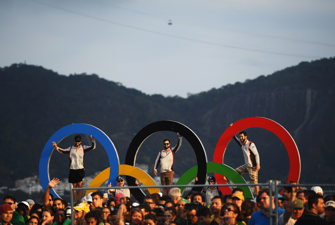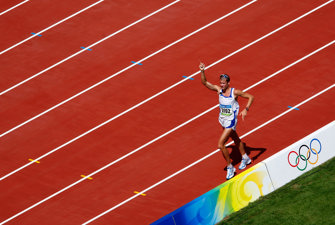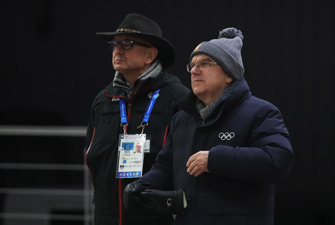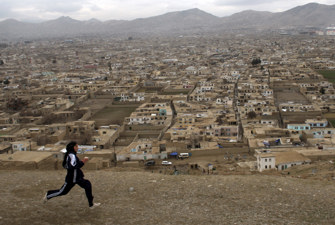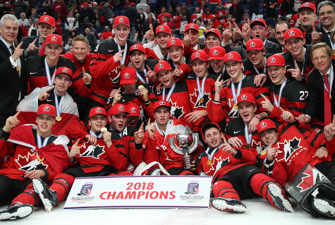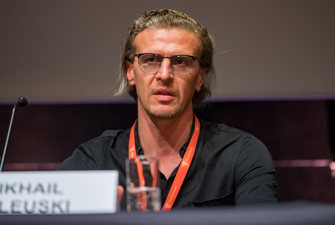A fist of freedom or a fist of iron? Rule 50 and the Olympic paradox
ANALYSIS: IOC President Thomas Bach made it very clear in his New Year’s speech that politics should be kept out of the Olympics to protect the event’s neutrality. However, it is a paradox that IOC’s characterisation of politicisation only seems to apply to athletes and not the host nations, writes Play the Game’s analyst Stanis Elsborg.
Amid an increase in athlete activism and with the upcoming 2020 Olympics in Tokyo in mind, Thomas Bach, the president of the International Olympic Committee (IOC), used his annual New Year’s speech to address what he calls “the growing politicisation of sport”. Bach also used the spotlight to make it very clear that according to the IOC “The Olympic Games … are not, and must never be, a platform to advance political or any other potentially divisive ends.”
In the wake of Bach’s speech, the IOC released a set of guidelines developed by the IOC Athletes’ Commission that reiterate the much-debated Rule 50 of the Olympic Charter, which states that “No kind of demonstration or political, religious or racial propaganda is permitted in any Olympic sites, venues or other areas.” The guidelines specify that political messaging or gestures of a political nature like kneeling or hand gestures are not permitted during the Olympic Games at all Olympic venues, including the field of play, the Olympic village and during Olympic ceremonies. However, athletes are allowed to express their opinions during press conferences, interviews, and team meetings as well as on digital or traditional media, or other platforms.
But what does the IOC mean by politicisation of sport? This article takes a historic look at opening ceremonies at the Olympic Games and disputed athlete actions to show how politicisation in IOC-terminology differs depending on whether you are an athlete or the host nation that pays to arrange the Olympic spectacle.
A spectacular spectacle of politics
“All the world’s a stage” Shakespeare said in his pastoral comedy ‘As You Like It’. The quote perfectly describes the modern Olympics and its opening ceremony, which in the present-day serves as a platform for cultural propaganda for the host nation. It is a unique possibility to present a well-produced and staged image of the nation’s past and present and gain what in international relations is termed ‘soft power’. Unlike ‘hard power’ – such as military inventions or economic sanctions – soft power is based on persuasion and attraction, which is enabled by the recognition of a country's culture, political values and foreign policy.
In the last decades, nations like China, Russia and Qatar have invested heavily in sporting mega-events – not for the sake of sport but in an understanding of sport as a political tool. However, it was the democratically elected president of the United States, George W. Bush, who dared to change the opening words from the head of state at an opening ceremony of the Olympic Games – an address which the recently released guidelines clearly state must have exactly the same wording every time.
But did the IOC then forget to enforce its rules when Bush – with a not very concealed hint to the terrorist attack at the World Trade Center in 2001 – twisted the opening words of the 2002 Winter Olympics in Salt Lake City?
"On behalf of a proud [read: We are not beaten], determined [read: We are coming after you] and grateful nation [read: Thank you to the nations of the world for supporting the fight against terror]”, Bush said, before continuing “I declare open the Games of Salt Lake City, celebrating the Olympic Winter Games.”
Even though Bush’s addition to the traditional opening declaration may have drawn sympathy, it was also against the rules.
The former president of the United States was also surrounded by American athletes, and during the flag ceremony, a burnt and torn American flag allegedly found in the World Trade Center after the attack was carried by athletes as well as 9/11 police officers and firefighters.
The Sochi Olympics: A new history of Russia
In recent years, the 2014 Sochi Winter Olympics serve as a prime example of the connection between sport and politics and how nation states use the Olympics as a platform for political messaging. Thomas Bach was quick to praise the Russian President Vladimir Putin and the Russian organisers for the staging of the Olympics by stating that the Russians fully respected the Olympic Charter.
However, the IOC president must have turned a blind eye to the opening ceremony of the Sochi Games where the political and national symbols were hard to miss. Under the direction of Putin’s close ally, the director of the Russian state-owned TV Channel One, Konstantin Ernst, the Russian state took advantage of the opening ceremony to create a picturesque and highly orchestrated image of the country.
In fact, in my research with scholar Andreas Juul Ingvartsen, I have shown that there are two TV versions of the opening ceremony in Sochi: One that was transmitted to the Russian audience, and one for the foreign viewers in countries like Denmark, Norway, Germany, and Australia. There were significant differences between the two versions in terms of political and nationalistic messages. The hammer and sickle – probably the most common symbols of communism during the era of the Soviet Union – were shown 12 times in the Russian version and only 7 times in the international version. The Russian flag was on camera 335 times in the Russian version compared to 117 in the international version. Most notably, however, was that Putin was shown 40 times in the Russian version against only 16 times in the international version.
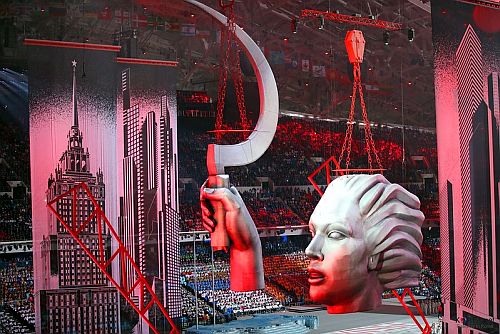 In one of the segments of the opening ceremony at the 2014 Sochi Winter Olympics, large elements from the Soviet statue "The Worker and the Kolkhoz Woman", which include the "hammer and sickle", floated across the stadium floor accompanied by dramatic music. Photo: The Korean Olympic Committee/Korea.net
In one of the segments of the opening ceremony at the 2014 Sochi Winter Olympics, large elements from the Soviet statue "The Worker and the Kolkhoz Woman", which include the "hammer and sickle", floated across the stadium floor accompanied by dramatic music. Photo: The Korean Olympic Committee/Korea.net
Overall, the Russian state used the opening ceremony to create a national narrative that glorified the Czarist and Soviet era. The political aspects of Soviet communism fell into oblivion and instead its economic and social aspects were hailed as a backdrop to today’s modern Russian state. In a segment entitled ‘Moscow/The Dream’, the Soviet industrialisation from the 1950s and onwards was portrayed almost as a consumer paradise and a regulated welfare state, which is far from the truth. There was no mentioning of the more catastrophic and devastating aspects of Stalin's regime such as political repression, mass extermination and the forced industrialisation.
In this way, not only does the IOC provide the host nation with the most wanted TV platform with a reach of billions of viewers to express its political agendas, but it also allows the host nation to completely rewrite parts of its history in order to make it fit a more perfect image.
Same same, but different – the cases of Beijing and London
In 2008, the Chinese organisers also used the opening ceremony of the Olympic Games in Beijing for political self-promotion. The opening ceremony was for example used to signal ethnic integration in the world’s most populated country with more than 1.4 billion people. Children in national costumes from the 56 different ethnic groups in China carried the national flag into the stadium before handing it to Chinese military personnel who oversaw the hoisting of the flag. It later turned out that the children were not at all representatives from all the different ethnicities, but only from the ethnic group of Han Chinese, which makes up 92 per cent of the population.
Democratic nations also understand the unique opportunity that the opening ceremony offers in terms of selling a positive narrative of the nation’s culture and history. The 2012 Olympics in London had a special agenda in advocating for Western values such as open and tolerant communities in a tribute to the British welfare system, multiculturalism, women’s liberation and civil rights, just as human rights activists helped carry the Olympic flag. As with all Olympic ceremonies, the darker sides of British history were omitted including the repression of Ireland, colonialism, slavery, and the downsides of the industrialisation like pollution and child labour.
Freedom of expression – but not for all
It is a paradox, that while the IOC never in the long history of the Olympics has enforced Rule 50 on a host nation for its use of ceremonies to stage nationalistic and political messages, it is quite a different matter when it comes to the athletes.
One of the clearest examples of the limitation of athletes’ freedom of expression happened at the 1968 Olympic Games in Mexico City. During the playing of the U.S. national anthem at the medal ceremony of the men’s 200 meters, Tommie Smith and John Carlos raised a black-gloved fist – a black power salute and symbolic gesture showing their dissatisfaction with their home country’s race policy. Their political statement subsequently resulted in condemnation by the sports authorities and repatriation in disgrace while they were also being asked to return their gold and bronze medals.
At the same Olympics in 1968, Czechoslovakian Vera Caslavska captured the world’s attention when she turned her head down and away from the Soviet flag when the Soviet anthem was played at two medal ceremonies. A politicisation of sport? Not according to the IOC. Caslavska was later awarded the Olympic Order for her “particularly distinguished contribution to the Olympic Movement” and in 1989 she was awarded the Pierre de Coubertin International Fair Play Trophy by UNESCO for her “exemplary dignity”. A great fight for human rights in the U.S. was not accepted, but opposition to Soviet rule was praised.
While Smith and Carlos’ demonstration was condemned by the IOC in 1968, it is now praised at The Olympic Museum’s ‘Change Makers’ section with tributes to the two athletes’ raised fists as well as a headline saying: “When the podium becomes a stage – Denouncing poverty and racism.” Also, the two Americans were recently inducted into the U.S. Olympic and Paralympic Hall of Fame – 51 years after their iconic moment. But what is praised at The Olympic Museum will not be allowed at the Olympics in Tokyo as the new guidelines specifically state that no raised fists are allowed.
While the above example dates back more than half a century, athletes today are facing similar punishments for expressing themselves politically at sports events. Recently at the Pan-American Games in Lima 2019, U.S. athletes Gwen Berry and Race Imboden were put on a year’s probation by the U.S. Olympic and Paralympic Committee for respectively raising a clenched fist and kneeling during the national anthem in protest of the U.S. gun policy, racism, and treatment of immigrants – and according to fencer Race Imboden also in protest of what he calls Trump’s spread of hatred in American society.
Apolitical in any case? Not really
The IOC’s own aspiration of being a globally recognised peacemaker does not make it easier to uphold the image of a completely apolitical sports body. This was clearly illustrated at the 2018 Winter Olympic Games in Pyeongchang. For the first time in the history of the Olympic Movement, the IOC allowed a joint ice hockey team from South and North Korea to compete at the Games, even though the team from North Korea was not qualified.
With the approval of the IOC, the opening ceremony once again became a platform for mixing sport and politics. Firstly, by allowing South and North Korea to march under one flag at the parade of nations. Secondly, by allowing a female ice hockey player from both South and North Korea to carry the Olympic torch side by side into the Olympic Stadium. Thirdly, by staging a handshake in the VIP box between the South Korean president and Kim Yo-jong, the sister of the North Korean president.
On that occasion, the IOC spared no efforts in highlighting its ability to unite nations in conflict and the significance of ‘the Olympic Truce’, an international ceasefire established by the IOC together with the United Nations.
Four years earlier, the IOC was less eager to react when Crimea was annexed by the Russian Federation just as the lights of the closing ceremony of the 2014 Sochi Olympics were fading. The IOC president praised “the new Russia” without a word about the violation of the Olympic Truce which was in effect until the end of the following Winter Paralympics. Neither did the IOC show compassion with the Ukrainian team at the Winter Paralympics. They were not allowed to wear black armbands in respect of their fallen countrymen.
While the newly released guidelines developed by the IOC Athletes’ Commission are surely more transparent in terms of what is not allowed at the Olympic venues, it will be interesting to see whether or not Rule 50 applies to both athletes and the host nations in the future.
Further reading
Bonde, H. (2015). Between tightness and looseness: the politics of the London Games in the light of the Beijing Games. In: D. Hassan, & S. Mitra (red.), The Olympic Games: Meeting New Global Challenges (p. 100-113). London: Routledge. Sport in the Global Society - Contemporary Perspectives.Elsborg, S. (2018). Putin's use of sporting events as a domestic policy tool.
Elsborg, S. (2018). Putin’s use of sporting mega-events as an “arena for historical memory” (in Danish).












